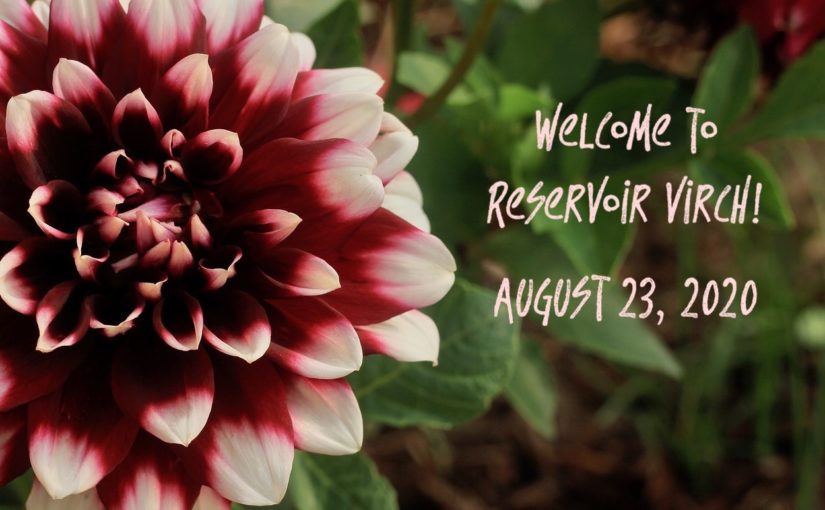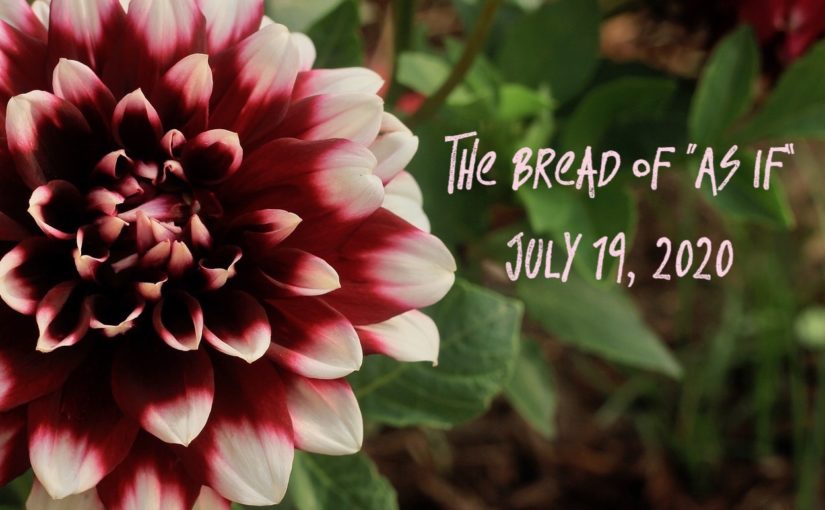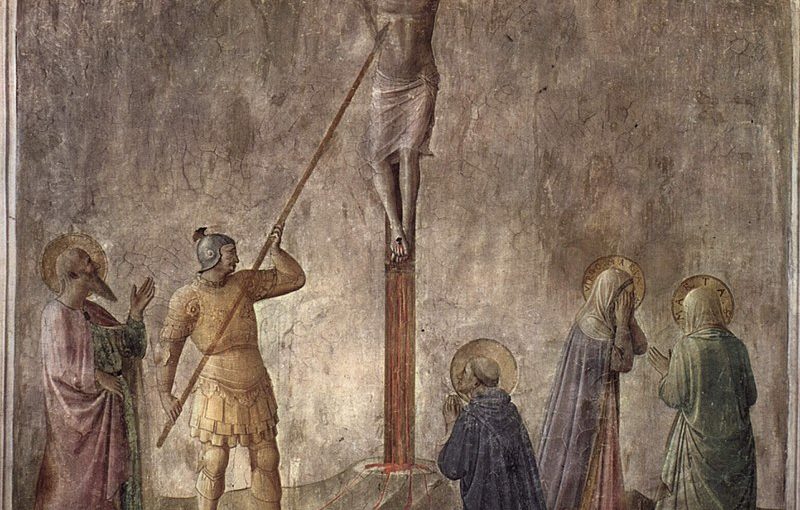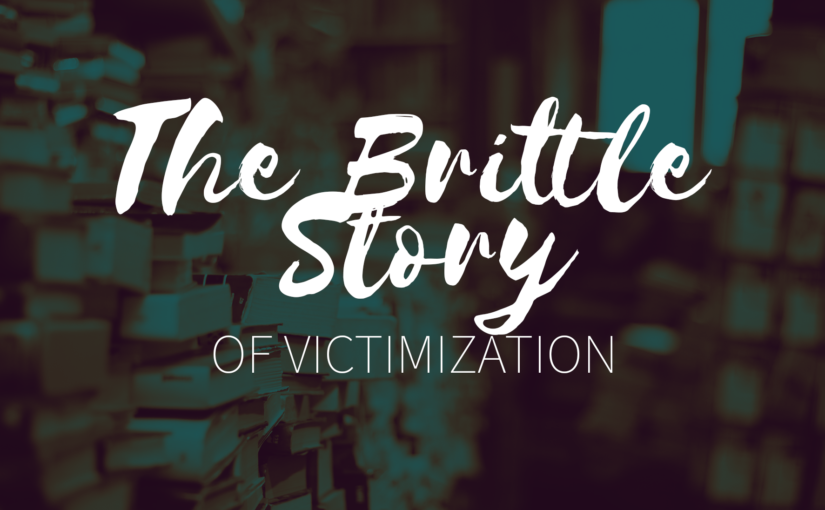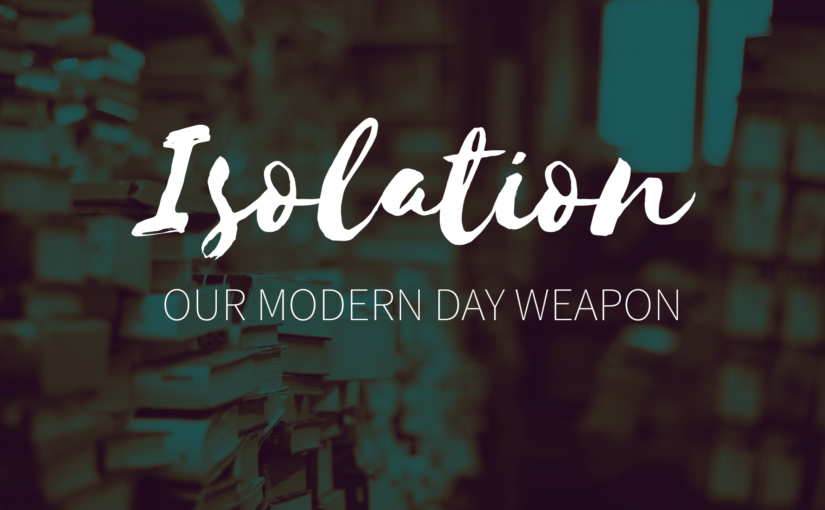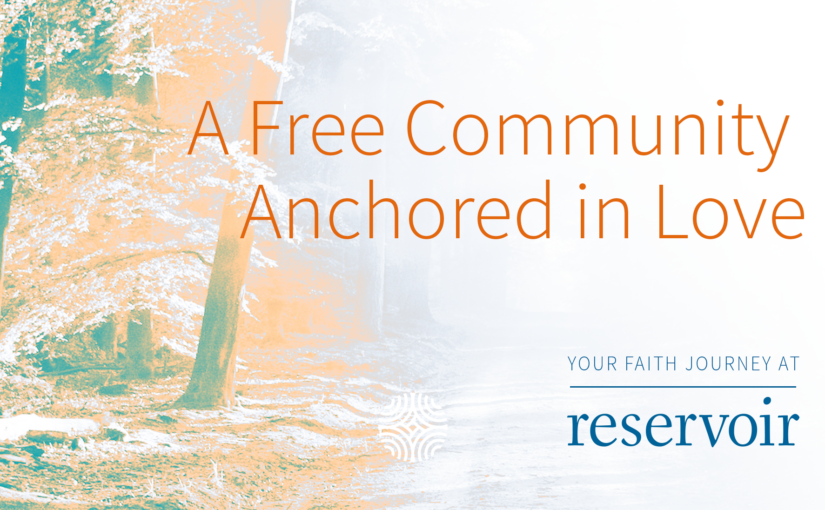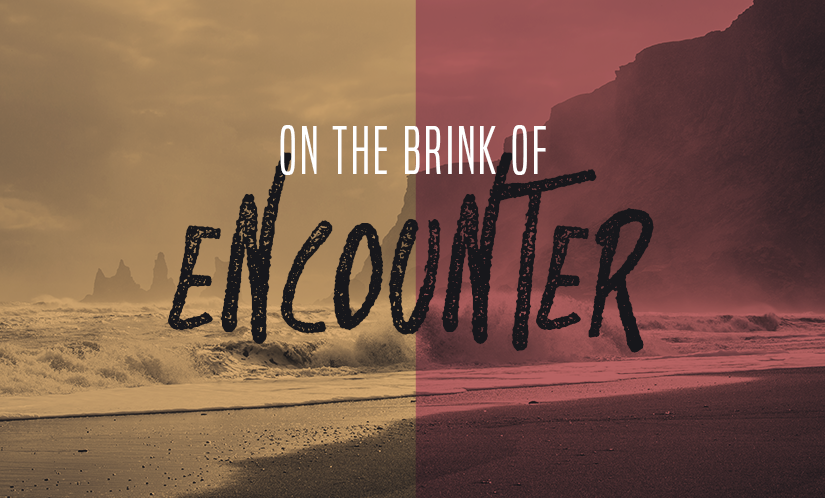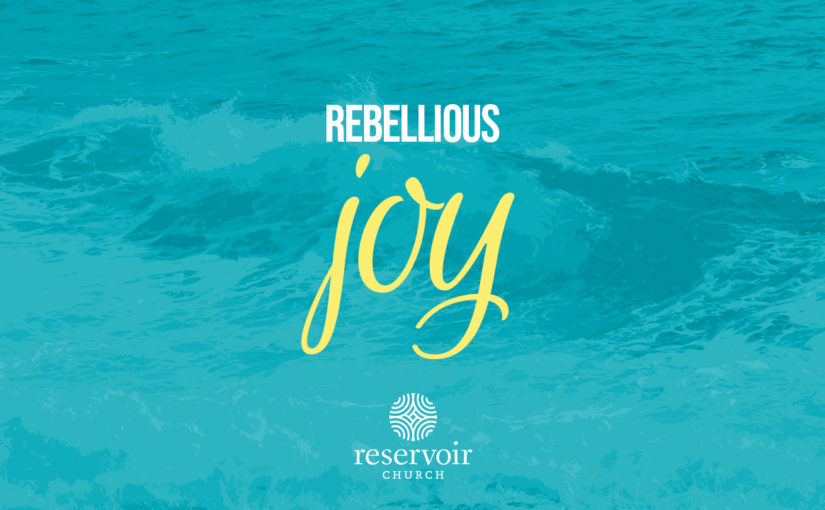Last in the Series, Seven Stories: Jesus’ Big Story, and the Other Stories by Which We Live
Welcome everyone! I’m Ivy, Cate mentioned. It’s so great to be with you this morning – so lovely to have a room full with the texture of many of you who regard yourselves as young at heart – and many of you who are just, well – young…. Our kid’s programming takes a break once and awhile – and this Sunday is one of them – so welcome all you toddlers and kids! It’s a joy to have you, and your voices and energy in the room this morning!
Next week we will enter the season of Lent, these few weeks leading up to Easter. We’ll spend these weeks as a community considering the centrality of the cross – and we’ll explore this through a myriad of ways; a daily reflection guide – (that includes Bible and poetry), some thoughts on our blog around “Why did Jesus Die?”, authored by Pastor Steve , sermons of course, special services, Ash Wednesday 2/26, a participatory liturgy, and Good Friday service. It is a rich season which I’m looking forward to pressing into with all of you – and if you are looking to explore this season with others, beyond a Sunday morning experience – it’s also a great time to consider joining a community group (booklets in lobby, me, website).
Today though, we are wrapping up our winter series, Seven Stories. We’ve spent the last few weeks exploring 5 primary stories that authors Brian McLaren and Gareth Higgins suggest we’ve been telling and listening to for far too long – stories that don’t seem to usher in connection, liberation, creativity or peace for us all. We’ve looked at the stories of domination, redemptive violence, isolation, purification and accumulation. We’ve told stories, and read scripture, posed reflective questions and gave helpful spiritual practice tips to help us pause and consider just how these stories are woven into our beings. Not just stories we can witness or identify – somewhere OUT there – but WHERE, IN US these stories live… and WHY…. And how on earth, these stories are told with our words and lips and bodies – and HOW we go about the work of unearthing them, shifting them, and yes, (changing direction), repenting from the ways we perpetuate these stories.
Today – as is true every time I stand here – I preach to myself first. . .. because I am still WAKING up to some of these stories , still acknowledging and owning responsibility for where I participate in telling them, and I’m still trying to do the work and effort it takes to change them. I’m finding that these stories, (maybe not so surprisingly), DEMAND our trust in the extraordinary, supernatural story of Jesus to shake our constitutions again – to bring us to our knees with the belief in the power of the miraculous spirit of love , “to see that the movement of the Spirit of God – often call us to act against the spirit of our times, [these prominent stories of our days], with wisdom, humility, and courage ….” (Howard Thurman).
And to “learn once again – as Howard Thurman says, how to put at the disposal of the limitless demands of our [painful experiences]- the boundless resources of God – to see that instead of just enduring [being a victim to] this life, that we can float it.” (Thurman, 173).
The story of victimization, which I’ll talk more about today – tells the truth of the pain we incur in this life and also the lie that life is nothing more than pain…. (and that we are powerless to it).
Now where we move from being a real victim of injustice, to a mentality of victimhood – that holds us prisoner to our pain – is sometimes hard to parse out. How much time must go by? A month? 1 year? 5 years? 10 years? I guess the question is less about time and more about what we do with the pain we all experience as humans. Do we tell the truth about this pain – and let it transform us? Or do we as Richard Rohr is known for saying, “transmit the pain” out into the world through defensiveness, anger, fear. This is a big question, particularly for those of us – like myself, who are white – and enjoy high status, high pay, high privilege, power and authority. So I invite you to let this question roll around throughout the sermon toda,y and see if it is relevant to you.
The story of victimization is a story woven in, and a product of all the other stories, I mentioned earlier. It’s a tangle of knots and harm and lies – of structures, and people’s actual lives, our children, and institutions and dreams and nightmares – all contorted to fit into boxes of “us v. them”, upon which we’ve built a world, a way of being.
“Us versus them.
Us versus some of us.
Us in spite of them.
Us away from them.
Us competing with them to get more “stuff”.” (McLaren & Higgins)
We can not untie one story from the other – without being willing to look and face the full entirety of it’s mess. This is why it’s so daunting to start. What thread do we pull first? What’s the entry point?
Humanity has never known what to do with unjust suffering – yet is our universal experience on this earth. We are all wounded. We have wounded, and we have been wounded. Wounder/woundee. And to be wounded, harmed, to suffer – all of it is unjust, and to be a victim is to endure unjust suffering. “Spiritual masters teach us that it is not what happens that causes us to suffer, but the stories we tell about it” (McLaren & Higgins, 133). So maybe the starting line – the way into these complex network of stories, is the locus within ourselves that holds ‘yes’ the pain – but also the possibility for transformation of that pain, Jesus’ deep, powerful love.
Today, I invite you to start with yourself. To consider what pain you might be in and where that pain resides right now? What have you done with it? Where have you placed it? What are the challenges the barriers? What story are you telling about this pain?
Prayer: Jesus we/I plead for your help. Where answers are so scarce – We ask for your mercy – as we stumble to create them – could you listen to us? Could you guide us to our hearts, where our pain is lodged, and also where your love resides.
MY STORY: A couple of weeks ago I spoke about the story of isolation and in that I shared more than I ever have about the particulars of growing up in a small mill town in Maine. I shared that the ethic of this town was built around this paper mill culture – where generational pride and loyalty spun out of working really hard and making an honest living – and held the nexus of where people formed their identities and found belonging. (the lore is that many people who graduated from the local high school say on a Thursday – would work their first shift at the mill on a Friday – this is how deeply the mill’s story was entrenched into “who people were”).
The suffering that people endured however, due to poisons and toxins from these mills – found in the erosion of their land, water, air and decaying, cancer-ridde-bodies – – was not acknowledged even as attention to this link grew greater. Even as the EFFECTS of this suffering and pain was impactful and noticeable in their real lives.
People lost their jobs.
Healthcare coverage.
Houses.
Land.
Families.
Businesses closed.
Schools closed.
People moved away.
Depression and deaths of despair grew:
Opioid related deaths.
Suicide.
Harm, pain and suffering grew.
People were hurt….. And people were victims of injustice at the hands of this great, powerful institution the paper mill. Which continued to spill out evil with threats of slashing healthcare coverage, over-time on Sundays and all holidays, even as people were dying of mill-related diseases.
Not knowing really what to do with all this pain,
People isolated, because they didn’t want to be hurt again in that way… And they turned to each other in these bunkers for protection and safety, and they asked the questions of PAIN; “Why me?” “How could my livelihood be so disrupted?” “How could my dreams for my family and my life – be so sidelined?” “I’ve worked so hard.” “I’ve been so good!”
This was a strong thru-line in my town – and perhaps nationally – that bad things couldn’t happen to good, hard-working, people.”
Such valid questions, and feelings…
People were looking for a meaning for their suffering.
An answer that could provide:
A release valve, something to inoculate the pain.
A place to deposit the tears, the outrage, the fear.
An answer that would be a remedy to the exhausting plight of poverty that echoed in their bones.
Pain charges and fires all of the receptors in our bodies and it communicates to our brains, “I am being dealt with in a manner that is ruthless because this suffering ignores my private world of concerns!” (Thurman 171).
There wasn’t an answer, or for that matter much redemption on the horizon for folks in this mill town. And where there is an alarming deficit of good/hope/joy people tend to give up on life, and each other. This hopelessness manifests often in cynicism, bitterness, negativity and blaming as a substitute to looking squarely at the pain – and it’s not a bad approach because it provides immediate satisfaction.
With the amped tensions and fears in my town – and with no direct acknowledgement of pain, victim- mentality set up strong and ran deep. People felt as though suffering would and could only be the only story in their lives – there was no way out – and they felt powerless in this. This is a scary place to be with little resources, with shame and failure, as new, thick words in your vocabulary.
Our primal instincts kick in when we are in pain – and they cause us to fight or flight. Many people in my home town (and surrounding towns), enacted the “flight” mode – isolating – separating themselves.
But many others also chose to FIGHT. The first step in fighting – is to identify the enemy, the bad guy, the source of harm – who will I blame for the pain? We create the scapegoat.
“Philosopher René Girard sees this tendency to scapegoat others as the central story line of human history. Why? Because it works. The scapegoat mechanism was almost perfectly ritualized by the Israelites. They enacted placing their sins on a poor goat and sending it off into the wilderness to die, thus the name, scapegoat”. (Richard Rohr).
When we can find our scapegoat – it acts as a relief valve initially, it brings about a sense of justified peace – and gives us a sense of satisfaction. And for those of us who are used to holding power – the satisfaction allows us to have that familiar scent of power again, to be in control again – and we get to deposit our fear, our hate, our frustration on SOMEONE else.
Many mill workers stood up to the institution that brought harm to so many. 1200 mill employees decided to strike to bring truth to power for the ways the mill continued to pump pain into people’s lives. The mill responded with fear and defensiveness and fired all of these workers.
The mill also replaced all of these workers with new workers. Many, as it turns out were family members, friends, neighbors of those who originally struck. Folks in town were desperate to make ends meet, the mill paid well above the hourly wage, and many jumped at the chance to get in at the mill, even if temporarily while the strike was active. The strike lasted 16 months and when it was over not one of the original strikers got their jobs back. The replacement workers were permanent.
This, created new schisms, fractures, new enemies – and fresh scapegoats. Life was bleaker, more pained, and now riddled with a deeper story-line of victimization for many. Not only had the town quickly divided over that stretch of time – they had also VERY quickly, “accepted violence as a natural expression of pain”. Epithets, rocks, ball bearings fired from sling-shots were hurled at strikers… And those who did not support the strike were taunted with curses, and men whose closest brush with the law had been no more than a parking ticket started carrying guns and baseball bats in their vehicles. Kids in my classes at school – faced bullying at the power of teachers – who may have had relatives or friends – that were on the other side of the strike line. It became a tangle of these primary stories.
Playing the victim is a way to deal with pain indirectly. “You blame someone else, and your pain becomes your personal ticket to power and control. …because it gives you a false sense of moral superiority and of having been offended”(Rohr). But it doesn’t catalyze anything except more fear, more pain, more defensiveness and a brittleness of always being on edge.
It also creates a very fragile system of people. Because now – not only is the institution the source of your personal pain – but the possibility that your neighbor, friend, family member is now also on the table – there’s no one to trust. We are always the victim.
With this posture, the side-eye that someone gives you in the check-out line, the push that someone gives you on the soccer field, the fact that someone didn’t pick up your phone call -or email you right back, or the feedback you got at that meeting, or the feedback you didn’t get at that meeting – it all lands personally, as an attack, and your wound stays fresh.
Richard Rohr says, “We are all tempted to project our problems on someone or something else rather than dealing with it in ourselves….because it takes away our inner shame and anxiety and gives us a false sense of innocence.”
But he says it “doesn’t ask us to grow, or to change, or transform. You don’t have to grow up, you don’t have to pray, you don’t have to let go, you don’t have to forgive or surrender—you just have to accuse someone else of being worse than you are. And sadly that becomes our very fragile identity, which always needs more reinforcement.”
Again – here’s a snippet of my small-mill-town-story, and if it doesn’t resonate or feel relevant to you – than so be it… But I think it points to the greater patterns we enter into – when we take on a victim mentality, when we scapegoat and perpetuate harm. And it’s how we get into loops of conversation that I hear so often, “my pain is greater than your pain”, or “I’m a victim too”, or “oh, I haven’t oppressed you”, and this is all symptomatic of evading our pain. Which actually leads to deepening the trenches of our own wounds – keeping them raw and bleeding – far away from healing.
All throughout the Bible we see this play out – people in pain – threatened – stressed – wounded – and Jesus gives us countless models of how to transform our pain – How to not just be wounded – but to maybe be wounded and healers at the same time.. These models often incorporate an invitation to reorient to Him – the source of abundant love, healing and good news for everyone.
So I’d love for us to look at the scripture on your program, which gives us some texture in this regard:
Matthew 15:21-28 (NLT)
21 Then Jesus left Galilee and went north to the region of Tyre and Sidon. 22 A Gentile woman who lived there came to him, pleading, “Have mercy on me, O Lord, Son of David! For my daughter is possessed by a demon that torments her severely.”
23 But Jesus gave her no reply, not even a word. Then his disciples urged him to send her away. “Tell her to go away,” they said. “She is bothering us with all her begging.”
24 Then Jesus said to the woman, “I was sent only to help God’s lost sheep—the people of Israel.”
25 But she came and worshiped him, pleading again, “Lord, help me!”
26 Jesus responded, “It isn’t right to take food from the children and throw it to the dogs.”
27 She replied, “That’s true, Lord, but even dogs are allowed to eat the scraps, the crumbs, that fall beneath their masters’ table.”
28 “Dear woman,” Jesus said to her, “your faith is great. Your request is granted.” And her daughter was instantly healed.
OOOOF – Jesus. Challenging picture here.
Again the message that I know of the good news of Jesus – is that He is the central source from which we have hope to transform our pain, to heal, to feel comfort when we are victims of injustice…at our most vulnerable. It’s a message that says Jesus is good, loving .. always. Always. always. Except, here, when he’s not? When he’s insulting and mean?
I am absolutely not going to make sense of all the possible interpretations of this passage, there are so many… but I’ll offer some perspective, which is not to be taken as the RIGHT way of interpreting what’s going on here – but as a possible lens through which you could explore for yourself, one that might open up something you hadn’t seen, or read or heard.
At a baseline I think there are some power dynamics going on here… that this story invites us to consider in our own lives –
This woman is from a Gentile region, so Jesus and the disciples moved into areas that most Jews would have considered unclean. This region, in particular has a long history of paganism and opposition to the Jews. In addition, this woman herself is regarded as unclean because of her demon possessed daughter. So she is facing, “ xenophobia, sexism, classism and social discrimination”, as her daily existance. (Gonzalez, 125).
Jesus comes into this region not with tremendous power – he’s a working class Israelite under Roman occupation – from a town of lower status – BUT – he still holds a fair amount of social power as it relates particularly to this woman. He is an able-bodied man, he is an Israelite with Israelite lands – he’s known as a respected teacher. And yet, what this woman seems most interested in – is not necessarily the power represented in those social strati – but the power he has access to, the power that she’s heard of from afar, that’s traveled over the lands and into her town – the power that she’s so compelled to find, despite her barriers – and this is the power to heal – the power that Jesus holds, to free this woman’s daughter or not, as he chooses.
He is part of a religious system that holds this power, as far as she’s concerned – and she needs it, she is suffering.
And here is the set up for humanity, right?
Power held by some, and needed by so many.
Howard Thurman says that, “there is something about such suffering that seems to be degrading, that seems to insult the human spirit. There is something about it that is unclean and demonic (171)” .
Suffering in and of itself – is already isolating, degrading, and insulting. And this woman is pushing through that suffering, oppression, marginalization – laying herself flat – desperate – crying out, on her knees… for HELP , JESUS!
And we see her rush to engage with Jesus – a source that could offer her relief, and healing… and what happens? He seems to add to the rejection, heap on degradation and injure with insult.
This religious system – that she thought might hold something different than all the other systems she’s been prey to – that might hold in it a healing power to expel the demonic and ravaging forces of suffering that her daughter and herself have endured – seems to offer nothing different, as she is also held victim to the words and actions of Jesus…..
This confirms for her, that his power is bound by the religious institution he is part of – his complicity with it.
Here is where I would have jumped right into a victim mentality… I would have thought, “this is enough – there’s nothing else. There’s no power that I can have access to, touch – if it’s not found in you, Jesus”… “I”m powerless, all of life will only be this suffering.”
And I do, do this often.
Just recently I had my brother and my sister-in-laws’ four kids, (all under the age of 10), for a few days in December – while they went on a trip.
Mercifully they let me use their van to transport our collective 7 children around. And the first day the kids were here – we all filed into the van, and I clicked a zillion seatbelts and carseats into place – and off we went to drop off one of my kids at practice.
On our way home we stopped at a beach on the south shore – where I enlisted all of them to collect and transport 100’s of rocks for an element in our Advent participatory liturgy service that we had in December.
(Surprisingly small children LOVE picking up rocks!)
Things were going so well, I thought I’ll stop at Dunkin’ Donuts and get everyone a treat :).
So we did, and as we drove out of the Dunkin’ Donuts parking lot, with a munchkin in each hand – I thought about how sweet life is. How thankful I am to be trusted with watching these little guys – and what a real delight it is for me, even though it was in the midst of a really busy season for me.
And then I feel something funny – at the back of the van – feels like the back end is sliding a bit – I ask the 10 yr old if she notices anything. She’s says, “Eh, this van is on it’s 3rd leg – it’s so broken down – everything sounds and feels funny all the time.”
And I thought, “Solid point”. Most of that van had things that were patched together to make do… gas tank, glove compartment…
But the sound and the feeling gets more pronounced and I decide to stop about ½ way home at a gas station.
Intending to top off the tires with some air.
I get outside and the back rear tire is FLAT to the ground, I mean on the rim!
I go to look for the spare tire – but we have 100’s of ROCKS covering the vestibule where it lives…
- And instantly I’m like, “You know what? Life is really crappy!”
And the monologue just continues:
“Everytime I try to do something nice – BAM! something bad happens.
Life is soooo tiring – and – exhausting – unforgiving.
Life is never just smooth, easy , free of “tragic events.”
I work so hard and never get recognized for it.
Never get any accolades.
Life just keeps giving it’s crappy – crap – crap – storyline to me over and over again.”
And there it is – it’s this old mill town story-line playing out in my life. The victim hood mentality that rears it’s head – that I can’t quite shake fully from my being. IN fact I really need to pay attention when I start telling that story to even realize that’s the story I’m writing. The story that says, “there’s no God here, I have no access to power, I’m powerless.”
The beauty of this scripture is that this woman doesn’t play the victim – or pull out the blame card – and she has every good reason to – but she did neither! She, “wouldn’t allow the events of her life to make her their prisoner.” (Thurman 179) And she stands firmly, strongly in front of Jesus. She doesn’t shame or yell or hurl insults back.
But she challenges him, I think, “Jesus what exactly are you trying to communicate here?”
“I hear of these great stories of healing that you’ve done – even of Gentiles and women (!) That seems greater than any power I’ve witnessed of a system! So how is it that the stories you tell through your lips and your hands communicate equality and healing – but you can be a part of a religious institution that systematically doles out elitism and exclusion?”
“And how is it I stand in front of you today pleading for mercy, healing and help – and you call me a dog?” (Which by the way in English, Greek or Aramaic calling a woman a dog is not a term of endearment – it’s an insult – a slur).
“How is it that your lips and your actions communicate harshness, and prejudice – but are supposed to build, with power, a KIN-DOM full of acceptance, freedom, wholeness, justice?”
I don’t get it – Jesus, where’s that picture of power – that everyone I’ve heard of is telling is so compelling ? the power of love? It seems like in either case you are throwing it away.
Don’t’ you see, that even the crumbs – Jesus – even the crumbs of love, could feed a dog like me. I followed those crumbs, here to you – today. That’s how powerful they are…..”
This woman speaks directly to Jesus and upholds his dignity, calls OUT his divinity – by naming him Lord all throughout the exchange… AND she also sees him as human.
And I think this is where we might stumble with this passage – it’s where we forget that Jesus is both fully human and fully divine.
But I think if we see his humanness here, we can be helped in our own.
What if fully human Jesus is a product of his system the way all humans are, and a fully DIVINE Jesus teaches us how to overcome those systems?
I think he does both here.
I do think he learned about his own prejudices from this woman.
And I do think he learned that he can perpetuate these prejudices, this harm that resides in the religious system he’s a part of – EVEN when He’s trying to build upon and fill out that very system with love and acceptance.
It is important to me that Matthew (and Mark) include the words that Jesus says – as much as they discomfort and challenge our picture of a loving Jesus. It shows how strong, and how insidious the tug of power is – of how privilege, even when enacted OFTEN in a compassionate manner – still has the propensity to continue the story lines of oppression and pain.
As much as blowing the tire out on my brother’s van, really stunk that day. The gas station that I drove up to – was thankfully also an auto mechanic garage… and the mechanic mercifully took me in immediately, just 10 minutes before they closed. He plugged the tire, charged me $25 – and my 6 children, were happy to take turns spinning each other around in an office chair – in the tiny vestibule at the side of the garage.
Hurray ! Glorious ending!
Hurray! Glorious ending – as a result of my whiteness and my privilege.
As much as I was a victim of this car breaking. And as much as I was a victim of poverty many years ago – I have to acknowledge and see that doors were opened for me – (literally that day) as a beneficiary of the system of racism – where doors were closed to two other people of color who came into have their cars serviced just a smidge after me – were turned away.
It feels relevant to me to think about how Jesus invites me to consider the reality that I’m not just a “representative” of systems of oppression – but how I am an active part of it… even if I don’t believe in racism or promote ideologies, the systems built on whiteness still perpetuate racist outcomes.
I think this is the use of power that Jesus might show us in this passage. That we have other options than to fight or flight. We don’t need to exclude or find a scapegoat, or play the victim. OUR energy trying to convince people that “I’m a victim too” – or that “I’m not racist” – is damaging to others and creates brittle inner landscapes, avoids responsibility and effects no change. Furthermore – it doesn’t get to this woman’s main desire – AND perhaps what we all come to Jesus to find; the power of love, the hope of healing, of transforming our pain. Where is it found, how can I access it? I think Jesus is showing us that we can’t get there unless we take steps at unharming – where we have harmed.
This poet I love, Nayyirah Waheed wrote these few lines (on your program):
unharm someone
by
telling the truth you could not face
when you
struck instead of tended.
– put the fire out (unburn)
Healing it seems – can only come from telling the truth. The truth about our pain – our sense of self – our worth – … The truth of stepping out of the victimization story – uncentering ourselves – and owning where we have harmed. Jesus shows us how to do this.
This is the mercy for us, that Jesus shows us his very humn moments in this story. He’s ignoring, he’s defensive, he doesn’t want to take time for this woman – he doesn’t want to be interrupted, he wants to find somewhere quiet… he tries his hardest to reject her, with exclusion and slurs – AND he uses his power for harm, instead of healing…
This woman helps him orient back to the true source of His power – not dictated in this religious system, but imparted to him by God.
This is divine power. (She is divine).
The divine power that helps him listen, reflect and repent.
This is the divine power of Jesus not only found in the healing of the daughter at the end of this story…
BUT found in Jesus’ repentance.
Now the word “repentance”, can make some of us bristle – it’s been twisted and used as a weapon – but like the words Steve spoke on a few weeks ago of “covenant” and “sacrament” – I think it is a religious word , that just might be worth recovering.
“The Greek word for repentance, translated to English is metanoia. Meta means “beyond” and noia means “thought” or “mind” .. together it means to change your thoughts or your mind, to turn in a new direction, to reverse a direction and go a different way.” (O’Tuama 200).
Jesus shows us here how to repent – when we’ve wielded our power in hurtful ways. He shows us how to grow up. To take responsibility – repent of the things that we can, to start the process of unharming, to be healers.
“To be open to the possibility of repentance is a sign of the goodness of humanity.” (O’Tuama 200).
Jesus showed us his change of direction – his mind opening to the resistance of this woman AND not in the privacy of a quiet meeting, but in the public field… where his power mattered.
Where he could show that his power really wasfor people, rather than over them…
Here, he showed us how to take steps to “unharm”.
To listen.
To receive feedback without defensiveness and brittleness.
Here in the public sphere is where the story of this woman will continue to be told, the one who bested Jesus in a conversation – not to make him look foolish or to compromise his following (as others in power tried), but to help him be better and healthier, and more divine.
Here in the public sphere is where stories of her daughter, liberated from the possession of a demonic spirit would be told… and where lines of logic and heart will follow -to see that pain was no longer transmitted into her lineage.
To tell the story that freedom is the fruit and product of systems of faith that are built on love, healing, listening, justice and repentance – and it’s how the demonic spirits of violence, dominance, isolation, purification, accumulation and victimization will be loosed.
Spiritual Practice for Whole Life Flourishing:
Read the scripture with an imaginative spirit this week:
Who are you in this story? The one wounded, oppressed and marginalized? The one who holds authority and power? The one who watches from the crowd?
Ask Jesus to direct your speaking up and/or your stepping back to listen, repent and aid in healing.
Read this poem this week:
unharm someone
by
telling the truth you could not face
when you
struck instead of tended.
– put the fire out (unburn)
— Nayyirah Waheed, Salt. (2013)
Who have you harmed? What truth have you not spoken yet? Or faced? Take steps to acknowledge, repent and aid in healing.
Prayer:
I need to repent in front of God and all of you here today, of the ways that I’ve knowingly and unknowingly benefited from my whiteness – where I’ve used my privilege to see – and not see – act and not act… And even more than that I need to ask for transformation – of my heart – and my words and my actions.
Sources:
Brian McLaren and Gareth Higgins. Seven Stories, E-book.
Padraig O’Tuama. “In The Shelter”, 200.
Karen Gonzalez. “The God Who Sees, Immigrants, the Bible, and the Journey to Belong,” 125.
Richard Rohr On Transformation (Franciscan Media: 1997), disc 1, (adapted from ).
Richard Rohr with John Feister, Hope Against Darkness: The Transforming Vision of Saint Francis in an Age of Anxiety (St. Anthony Messenger Press: 2001), 19-20, 22-24.
Howard Thurman.“The Growing Edge.”171, 173, 179.
Nayyirah Waheed, “Salt”, 2013.


